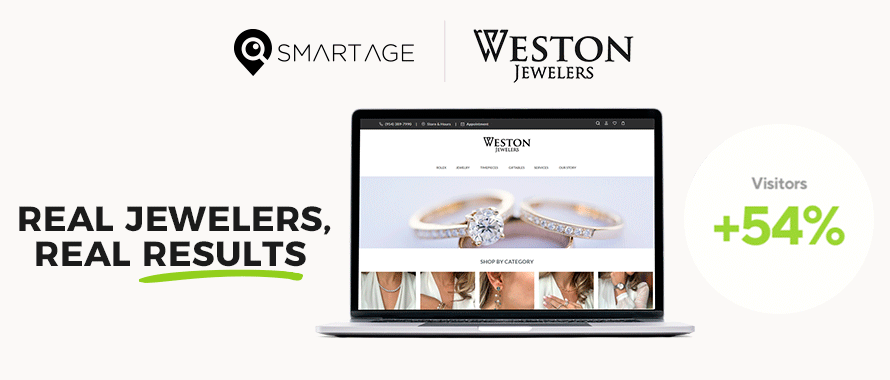Jewelry ECOMM Tech
Top 7 Ways to Improve Your Local SEO Immediately December 23, 2020 (0 comments)

This is especially true nowadays, where jewelry stores are more tech savvy and are now putting money into their digital marketing.
Typically, when we think of SEO (Search Engine Optimization), we're thinking about big national brands. However, there is another area of SEO - called Local SEO - that specifically helps businesses on the local level.
Optimizing for local SEO means more website traffic, leads, and conversions for your jewelry store. Yes - you'll be competing with local businesses for SEO ranking. That's the nature of the beast.
Additionally, optimizing for local SEO will help you compete against larger brands with huge budgets.
According to a study by ReviewTracker in 2017, 35% of all search traffic is local - and today, it's even higher. Without local SEO, your business could be losing out on a significant amount of traffic.
Here are the most straightforward ways to rank higher in local search results.
1. Create a Google My Business Account
The easiest way to start improving your local SEO is to get a Google My Business account. Most jewelers have these - if you don't, you're very behind.
Optimizing your Google Profile (aka your Business Profile) is perhaps the most effective way to rank higher in Google Maps well as gain visibility in Google Search local results.
Entering your information in your My Business profile will help Google know when to display you in Search Results and Google Maps.
2. Get Regular Reviews from Happy Customers
Once you have a Google My Business listing, the next thing to do is pack that with positive reviews.
Getting your customers to write glowing reviews for your business doesn’t just optimize your Google My Business presence; it also encourages more local customers to buy from you.
This is the absolute easiest way to increase your local SEO as well as downright sales. Lots of positive reviews on your Google listing.
Here are some tips to encourage customers to leave reviews:
- Ask for a review in person after the close of a sale
- Send a post-purchase email or text asking customers to write a review (but only after you’ve screened them via an internal survey to ensure you’re not approaching dissatisfied customers)
- Respond to existing reviews in a professional way, thanking reviewers and addressing complaints in not-so-favorable reviews
3. Optimize Your Website for Mobile
Most people access your website from mobile phones.
I've seen local businesses who get about 80% of their visits on mobile devices. In fact, Google now HEAVILY PRIORITIZES YOUR MOBILE SITE OVER YOUR DESKTOP SITE. This is called "mobile first".
There are a number of factors that impact your website's mobile experience.
In my opinion, this is one benefit of using a skilled web developer instead of just using some quick Wix-type website builder. Working with the right web developer can alter your code, themes, content, graphics, and databases to improve the mobile experience of users. This could mean much faster page load times and formatting pages properly.
It's important to plug your site into Google Search Console - you'll get notifications if Google detects any mobile issues on your site.
4. Hone in on Local Keywords
Your keywords should be relevant to local customers - not just customers on a broad, national level.
A simple way to do this is to use Google’s Keyword Planner. It'll let you filter keyword searches based on location so you get an idea of the popular search terms for a given region. This lets you create a list of locally relevant keywords to target. Once you have them, they should make appearances in your site’s meta content, copy, and URLs.
Also, include mentions of region-specific landmarks and hotspots in your content. For instance, if your local restaurant serves dinner in Manhattan, include references to “dining by Broadway” or “just steps from Times Square” on your site.
5. Use Location Pages or a Location-Specific “About Us” Page
Location pages are a must if your business has more than one location in an area. These pages need to provide the following, at a minimum:
- Store hours
- Name, address, and phone number
- Individualized descriptions
- Testimonials
- Promotions
- Parking availability
- Google Maps attached to each location page
Take care when you have multiple locations, because you need to create unique content for each page.
If you only have one location, creating an “About Us” page that focuses on local, relevant information is essential. For example, as a jewelry store, your “About Us” page is the perfect spot to mention your shop’s involvement in local charities or events.
6. Take Advantage of Online Business Directories
Online business directories are websites like Yelp, Foursquare, MapQuest, and YellowPages, just to name a few.
Not only will getting your business name, address, and phone number into these directories help visibility, but it’ll also boost your local SEO.
Your company listing should include the following basics:
- Accurate business name, address, and phone number consistent across all directories
- A backlink to your website
- A thorough description of your business
7. Focus on High-Quality Backlinks
Pretty much every single SEO expert in the world would agree that LINKS are the most important factor for SEO.
Google looks at other websites that have a link pointing to your website, and uses this as a way to judge a site on it's trustworthiness and authority. The example I always use is if you owned a shoe store and Nike included links on their website to your website. Google knows Nike is the king in your niche, so they'd treat that link as a vote of confidence from Nike to your store.
Here are some tips on getting high-quality backlinks:
- Create high-quality content on your site so others want to link to your content
- Guest blog on reputable sites with a high domain authority
- Engage with local influencers by social media or by email to get them to link back to you
Are there any other great local SEO tips that have helped you? Let us know in the comments!


